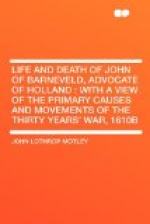The King, having listened with close attention, thanked the envoys in words of earnest and vigorous cordiality for their expressions of affection to himself. He begged them to remember that he had always been their good friend, and that he never would forsake them; that he had always hated the Spaniards, and should ever hate them; and that the affairs of Julich must be arranged not only for the present but for the future. He requested them to deliver their propositions in writing to him, and to be ready to put themselves into communication with the members of his council, in order that they might treat with each other roundly and without reserve. He should always deal with the Netherlanders as with his own people, keeping no back-door open, but pouring out everything as into the lap of his best and most trusty friends.
After this interview conferences followed daily between the ambassadors and Villeroy, Sully, Jeannin, the Chancellor, and Puysieug.
The King’s counsellors, after having read the written paraphrase of Barneveld’s instructions, the communication of which followed their oral statements, and which, among other specifications, contained a respectful remonstrance against the projected French East India Company, as likely to benefit the Spaniards only, while seriously injuring the States, complained that “the representations were too general, and that the paper seemed to contain nothing but compliments.”
The ambassadors, dilating on the various points and articles, maintained warmly that there was much more than compliments in their instructions. The ministers wished to know what the States practically were prepared to do in the affair of Cleve, which they so warmly and encouragingly recommended to the King. They asked whether the States’ army would march at once to Dusseldorf to protect the princes at the moment when the King moved from Mezieres, and they made many enquiries as to what amount of supplies and munitions they could depend upon from the States’ magazines.
The envoys said that they had no specific instructions on these points, and could give therefore no conclusive replies. More than ever did Henry regret the absence of the great Advocate at this juncture. If he could have come, with the bridle on his neck, as Henry had so repeatedly urged upon the resident ambassador, affairs might have marched more rapidly. The despotic king could never remember that Barneveld was not the unlimited sovereign of the United States, but only the seal-keeper of one of the seven provinces and the deputy of Holland to the General Assembly. His indirect power, however vast, was only great because it was so carefully veiled.
It was then proposed by Villeroy and Sully, and agreed to by the commissioners, that M. de Bethune, a relative of the great financier, should be sent forthwith to the Hague, to confer privately with Prince Maurice and Barneveld especially, as to military details of the coming campaign.




